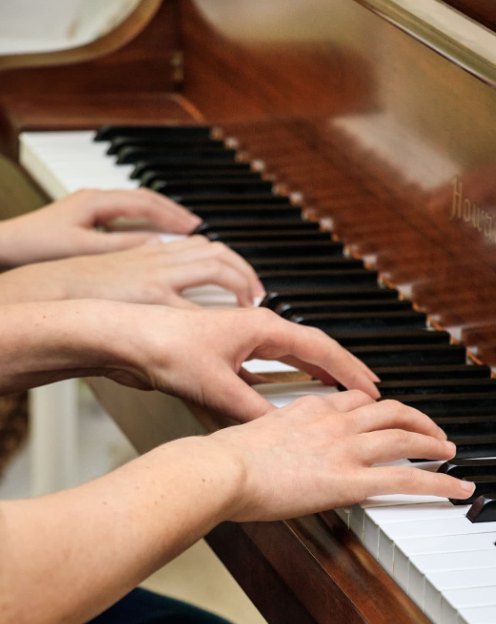My sister slaps my hand away from the keyboard.
“You’re doing it wrong, look, it should be like this…” She says, playing my part. I try to keep myself from snapping back at her and sigh in frustration. We’re not even five pages into the piano duet my teacher assigned us, and I’ve already had the urge to push her off the bench at least three times.
When my teacher gave us the music for our duet, my first thought was this isn’t going to go well.
Combining a jazz piece, tricky tempos, and two sisters wasn’t exactly a recipe for success in my eyes. And at first, I was proven (somewhat) right. My sister and I couldn’t practice for more than a few minutes without it devolving into a shouting match.
But slowly, through lots of yelling and restarts, duets taught me to communicate. At first, both of us treated the duet like a solo piece: we would each learn our own parts, and when we’d sit down at the same bench, they’d fit perfectly together. However, playing with another person was a completely different skill, as we’d quickly learned. Duets require you to not only ensure that your notes and tempo are correct, but that they match the other’s. Further, with four hands on one keyboard, negotiation with your duet partner is a must. Who’s pedaling, or turning the pages? Are we crossing our arms over or under? For once, I couldn’t brute force my way through learning music; I couldn’t stop or start when I felt like it. Duets are a collaborative effort.
Learning a duet also taught me to be precise. With solos, the margin for error was large. But even the simplest aspects of duets, such as starting and stopping the piece simultaneously, require musicians to be together. In his article, “The Pedagogical Benefits of Playing Violin Duets”, author Christian Paillan writes that through duets, “co-performer interaction and negotiation deepened [musicians] understanding of their [pieces], allowing them to express the music in a more effective and convincing way.”
Not only do duets require cooperation, but the skills learned in playing them are also applicable to solo music. Each partner brings new techniques and styles to the piece they are playing, and – whether you realize it or not – you are learning from each other. The time it takes two brains to figure out a tricky rhythm or section is far less than trying to comprehend it by yourself.
Duets taught me to communicate with my sister, a person who I thought I couldn’t be closer to, in a completely different aspect of life. Learning to play music with others instead of solely solo pieces is not just about improving technical skills, it deepens your musical connections and collaborative abilities. Whether you have goals of joining a jazz band or trio in college, or if you simply want to make music with someone you love, learning to play duets is a necessary skill for any musician.
Every Musician Should Learn and Play a Duet
An example of a piano duet, where four hands are used to produce music instead of just two.
Story continues below advertisement


